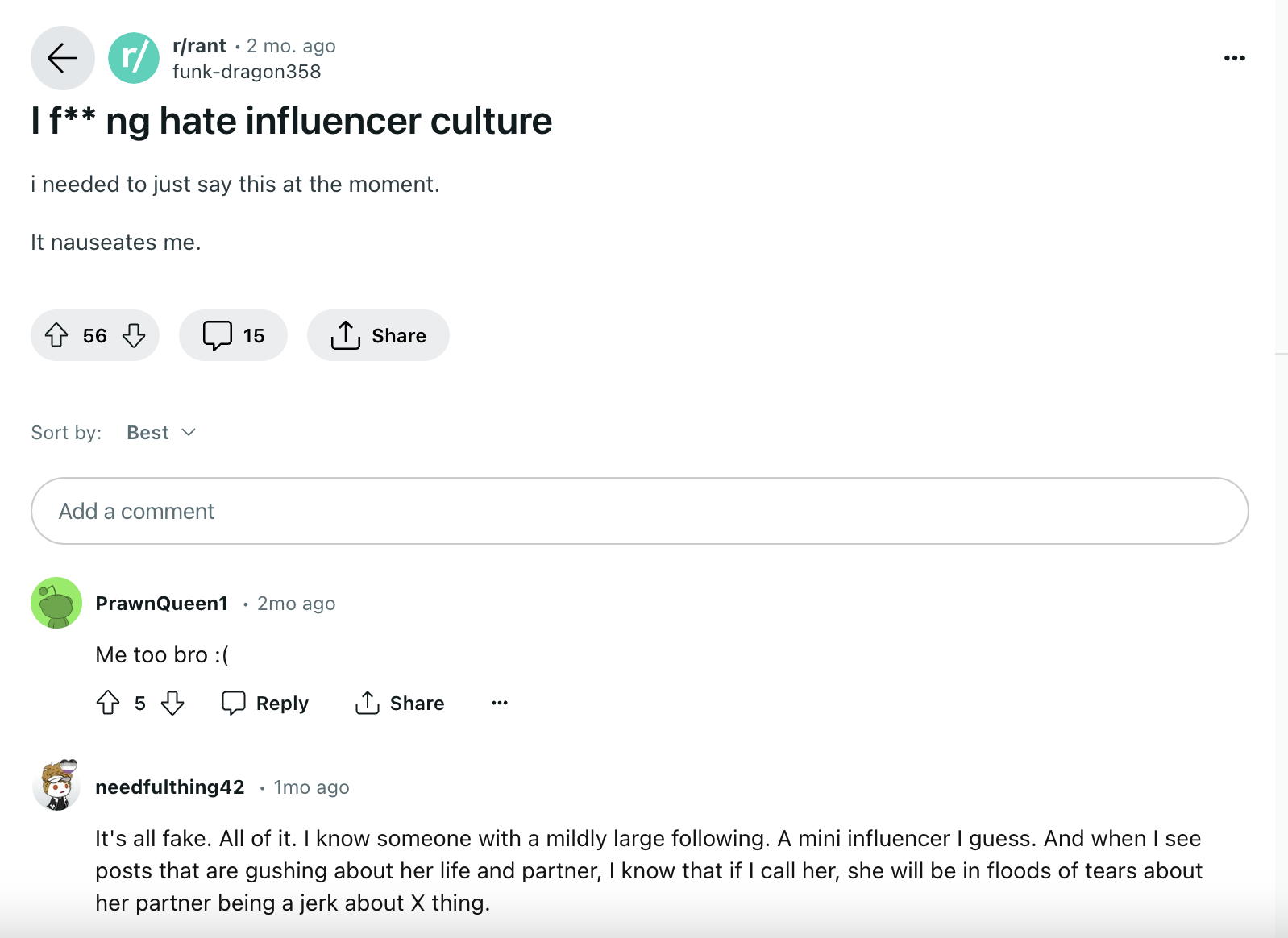“People influence people. Nothing influences people more than a recommendation from a trusted friend.” – Mark Zuckerberg
The rise of social media influencers has been one of the most significant phenomena of the digital age. These individuals, with their large followings and persuasive power, have reshaped marketing, entertainment, and even social norms. However, recent trends and shifts in consumer behavior have sparked a debate: Are influencers in decline? This article explores the changing landscape of influence and what it means for the future.
The Golden Age of Influencers:
In the past decade, influencers have enjoyed a meteoric rise. Platforms like Instagram, YouTube, and TikTok have provided the perfect stage for these digital celebrities to showcase their lifestyles, talents, and opinions. Brands have eagerly partnered with influencers for their ability to reach and engage with targeted audiences in a more personal and authentic way than traditional advertising.
Signs of Saturation and Skepticism:

Despite their success, there are signs that the influencer market may be reaching a saturation point. The sheer number of influencers has exploded, making it harder for individuals to stand out and maintain audience engagement. Additionally, there’s a growing skepticism among consumers about the authenticity of influencer content, especially when it’s clearly sponsored by brands. This has led to a decline in trust, with audiences becoming more discerning about whom they follow and why.
The Shift to Micro-Influencers and Niche Content:
In response to these challenges, there’s been a shift toward micro-influencers—those with smaller, but highly engaged, followings. These influencers often focus on specific niches, from sustainable living to mental health awareness, offering more specialized and relatable content. Brands are recognizing the value of partnering with these individuals for their ability to foster a deeper connection with their audience.
The shift to virtual influencers:
Virtual influencers are digital characters designed to mimic human influencers. They are created using advanced computer graphics and artificial intelligence and have their own personalities, stories, and social media accounts. Brands are increasingly collaborating with virtual influencers for their novelty and the ability to control their image and messaging. Examples include Lil Miquela, a virtual influencer with millions of followers, and Shudu, a digital supermodel.
The Impact of Changing Algorithms and Platform Policies:
Social media algorithms and platform policies are also influencing the reach and effectiveness of influencers. Changes in how content is displayed and monetized can significantly impact an influencer’s visibility and earnings. Additionally, platforms are implementing stricter regulations around sponsored content and disclosures, which could further challenge the influencer business model.
The Future of Influence:
Despite these challenges, it’s unlikely that influencers are in decline. Instead, the landscape is evolving. The future may see a greater emphasis on authenticity, transparency, and value-driven content. Influencers who can adapt to these changing expectations and continue to provide genuine engagement with their audience will likely thrive.
The world of influencers is undoubtedly changing, but it’s not necessarily in decline. As the digital landscape evolves, so too will the nature of influence. Brands and influencers alike will need to navigate these shifts carefully to maintain relevance and trust with their audiences. The key will be balancing commercial interests with authentic, meaningful interactions that resonate with followers.
How can influencers evolve to stay relevant? 10 Ways
Influencers can evolve to stay relevant in the following ways:
- Embrace Authenticity: Audiences value genuine content. Influencers should strive to be authentic in their posts, sharing both their successes and struggles to build a deeper connection with their followers.
- Focus on Niche Content: Specializing in a specific niche can help influencers stand out and attract a dedicated audience interested in that particular topic.
- Engage with the Community: Regularly interacting with followers through comments, direct messages, and community posts can foster a sense of community and loyalty.
- Adapt to New Platforms: Staying updated with emerging social media platforms and trends can help influencers reach new audiences and stay ahead of the curve.
- Collaborate with Others: Collaborating with other influencers or brands can introduce influencers to new audiences and provide fresh content.
- Prioritize Quality Over Quantity: Producing high-quality content that provides value to the audience is more important than posting frequently with little substance.
- Leverage Data and Analytics: Utilizing analytics tools to understand audience preferences and behavior can help influencers tailor their content strategy to better meet their followers’ needs.
- Continuously Learn and Grow: Influencers should invest in learning new skills, whether it’s photography, video editing, or storytelling, to enhance the quality of their content.
- Promote Social Causes: Aligning with social causes or movements can demonstrate an influencer’s values and commitment to making a positive impact.
- Be Transparent about Sponsorships: Clearly disclosing sponsored content and partnerships can maintain trust with the audience and comply with legal requirements.
By adopting these strategies, influencers can continue to stay relevant and maintain their influence in the ever-evolving digital landscape.
Questions about influencers:
When will influencers go away? Influencers are unlikely to go away entirely, but the form and impact of influencer marketing may evolve. As long as social media platforms and digital content remain integral to our lives, there will be individuals who wield influence within these spaces. However, the way influencers engage with their audiences and the types of influencers that gain popularity may change over time.
How long does an influencer last? The lifespan of an influencer’s career can vary greatly depending on several factors, including their niche, adaptability, audience engagement, and the quality of their content. Some influencers enjoy short-term fame, while others build sustainable careers that span years or even decades.
Are people getting tired of influencers? There is a growing sentiment of fatigue among some audiences, particularly when it comes to influencers who are perceived as inauthentic or overly commercial. However, influencers who maintain genuine connections with their followers and provide valuable, relatable content continue to thrive. The key is authenticity and the ability to evolve with audience preferences.
What will replace influencers? While influencers may not be replaced entirely, we may see a shift towards more niche and specialized influencers, known as micro-influencers. Additionally, there is a growing trend of virtual influencers—digital characters created using AI or computer graphics—who offer a new level of control and creativity for brands. These virtual personalities are gaining popularity for their unique, futuristic appeal.
Quotes about influencers
- Follow Industry Blogs and Websites: Websites like Social Media Today, Influencer Marketing Hub, and Later are great resources for staying updated on the latest influencer marketing trends and insights.
- Attend Conferences and Webinars: Look for conferences, webinars, and virtual events focused on social media and influencer marketing. These events often feature industry experts sharing their knowledge and experiences.
- Subscribe to Newsletters: Many industry websites and influencers offer newsletters that provide regular updates and analysis on influencer marketing trends.
- Join Online Communities: Platforms like LinkedIn, Reddit, and specialized forums have communities where professionals discuss the latest trends, challenges, and opportunities in influencer marketing.
- Follow Influential Figures: Follow thought leaders, influencers, and brands that are known for their innovative approaches to influencer marketing on social media platforms.
- Read Books: There are several books on influencer marketing that provide insights into the industry’s best practices and strategies. Some titles to consider are “Influence: Building Your Personal Brand in the Age of Social Media” by Brittany Hennessy and “The Age of Influence: The Power of Influencers to Elevate Your Brand” by Neal Schaffer.
- Take Online Courses: Platforms like Coursera, Udemy, and LinkedIn Learning offer courses on influencer marketing, social media strategy, and content creation that can help you gain a deeper understanding of the field.
- Analyze Successful Campaigns: Study successful influencer marketing campaigns to understand what strategies and tactics worked well. Many case studies are available online or in industry publications.
- Monitor Social Media Platforms: Regularly check popular social media platforms like Instagram, TikTok, and YouTube to observe current influencer trends, popular content formats, and emerging influencers.
- Network with Industry Professionals: Connect with professionals in the influencer marketing industry through networking events, LinkedIn, or other social media platforms to gain insights and learn from their experiences.
By utilizing these resources and actively engaging with the influencer marketing community, you can stay informed about the latest trends and best practices in the industry.
